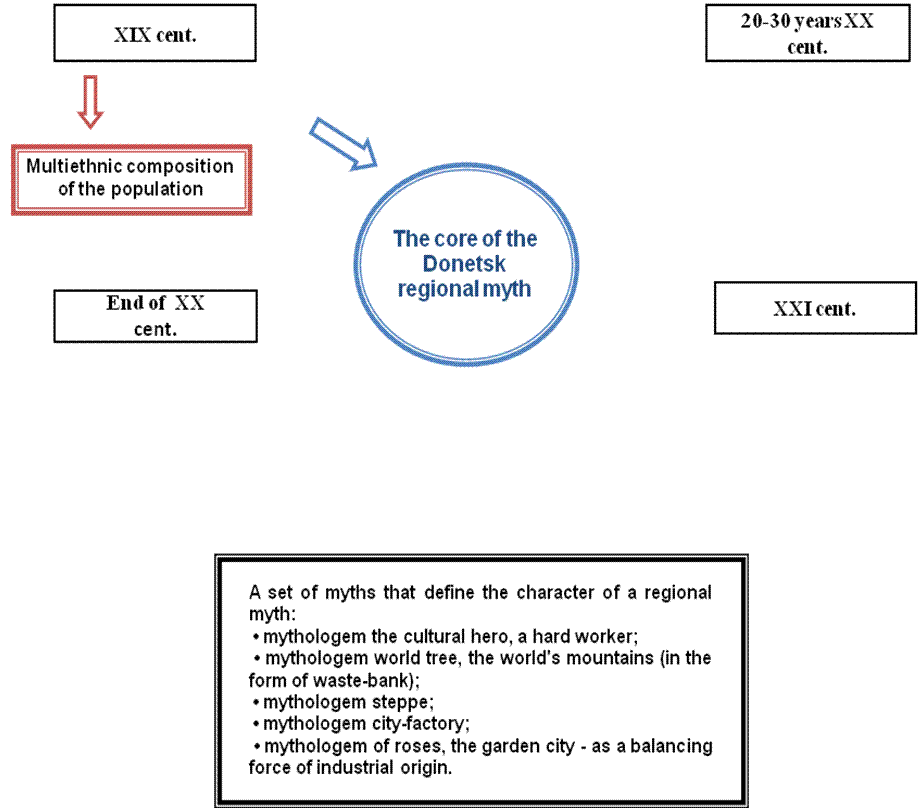AbstractContent
Introduction
1. Theme urgencyOne of the main trends of modern society appears a marked increase of the theoretical interest in mythology and the theory of myth. And in light of globalization approaches explicitly focus on the impact study of the regional aspects of social phenomena. In this regard, activation seen in regional studies of mythology as a socially formalized knowledge about the region, a strong regulatory and mobilization element in society, which is capable of forming a regional entity. To date, studies of specific regional myths have some space, first of all, there is no comprehensive approach to the study of this problem.
2. Goal and tasks of the researchThe aim of the arise summary of the theological philosophical explication of the religious and ideological foundations of the Donetsk regional myth, done by foreign and domestic researchers. Main tasks of the research:
Research object: historiographical and methodological aspects of research as a component of the social myth of the objective reality of modern man. Research subject: approaches to the identification of religious and ideological factors in the formation of Donetsk regional myth as a kind of social myth in modern theoretical concepts. 3. Theoretical studies devoted to the regional myth of Donetsk and Displaying ideological trends in formation of the mythological basis of regionQuestions and myth-making related to the work of different authors: in the scientific literature there are many attempts to appeal to the phenomenon of social myth, to analyze the place and role in society mythological models of famous stories, archetypal images, symbols, etc. Therefore, the study of regional mythology as a kind of social myth, we will directly or indirectly using a number of works of domestic and foreign scholars The structure of mythology, its content, form and degree of impact on individual and mass consciousness investigated K.Bart [7], E.Kasirer [12], Levi-Stross [15], M.Eliade [30] and others.
Social and
philosophical aspects of the mythology of domestic and foreign
researchers have studied S.Averintsev [1],
A. Belokobylsky [8],
O.Losev [16],
S.M.Telegin [27],
V.Nechaev [18]
and others. 1. cultural aspect: E.Taranenko [25, 26], Kuznetsov [14] and A. Agarkova [2 - 4]; 2. research in the development of cultural identity: A.Agarkova, V.Zablotsky [9], M. Smutok [23]. The collective article by I.Pasko, J. Pasko, G. Korzhov [20]; 3. research components of the mythopoetic folk heritage of the region. This work A.V.Ionova [10], [11]. V.I.Romanko [22]. The study P.T. Timofeev [28]; 4. materials of a sociological nature. D.V. Mironovich [17], G.Korzhov [13]; 5. historical research and work V.P.Stepkin [24], V.V.Olifirenko, F.D. Pustovaya [19], V.A. Pirko [21]. The core, the foundation
of the Donetsk regional myth consists
of a set of different elements. These parts are added to the foundation
in the historical development of the region. At the beginning of the
twentieth century occurred the influence of foreign capital. At this
time, continued colonization by different ethnic groups from the edge
of their culture and traditions. In the mid-twentieth century, the main
effect of producing Soviet ideology. This ideology was aimed at making
the industry glavnuya feature of the area. In celebration of laborers
and workers. As it formed the core of the myth of Donetsk, and what themes predominate in it can be seen in animation:

Figure
1 – Scheme of forming the nucleus of the Donetsk regional
myth in historical sequence
ConclusionHaving analyzed the
theoretical sources that explored the
phenomenon of regional mythology and in the light of scientific
research, now we can talk about the scientific basis for the study of
social mythology in general, and regional mythology as a species. But
there is still no coherent analysis of regional mythical space,
especially in view of Ukrainian material, in terms of transforming
traditional myth, religious and ideological roots.
As part of the research can make the following preliminary conclusions:
1. Generalizing to a particular theoretical orientation studies of the Donetsk regional myth, they can be divided into the following groups: those that explore the cultural aspects of the modern phenomenon of regional mythmaking, the study of cultural identity, as well as studies of social identity.
2. In determining the available methodological approaches and concepts to the study of myth and mythology of the regional once it becomes clear that the myth has long been the object of constant interest from many scientists. Considering the history of the study of mythology can distinguish different methodological approaches: the allegorical, and symbolic interpretation evgemerichna; comparativist approach to the understanding of the myth, the myth of theistic conception, linguistic theory; theory of ritual, functional and sociological theories of myth, psychoanalytic interpretations of myths; strukturaliska school, an understanding of myth as an ontological reality , approaches which are based on the allocation of an applied nature of myth. Thus, the diversity of approaches makes it possible to adequately interpret and multi-regional myth as a powerful component of modern social myth, its principles and essential characteristics. Given the above concept, we note that in the initial study is a broad understanding of regional myth as reality, which determines the outlook and attitude of man. 3. Finally, turning to the Donetsk mythopoetic texts and folklore that arose with the specifics of the creation and existence of the region during the Soviet period – you can highlight their ideological underpinnings. The favorable situation of the Donetsk region has allowed the local elite is here to translate the dream of the Soviet ideologues. This master's work is not completed yet. Final completion: December 2012. The full text of the work and materials on the topic can be obtained from the author or his head after this date. References
|


